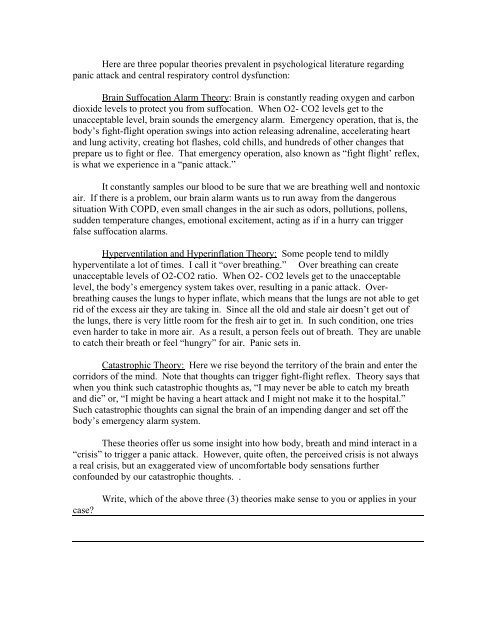Anxiety and Panic Attacks In Emphysema ... - Mind Publications
Anxiety and Panic Attacks In Emphysema ... - Mind Publications
Anxiety and Panic Attacks In Emphysema ... - Mind Publications
You also want an ePaper? Increase the reach of your titles
YUMPU automatically turns print PDFs into web optimized ePapers that Google loves.
Here are three popular theories prevalent in psychological literature regarding<br />
panic attack <strong>and</strong> central respiratory control dysfunction:<br />
Brain Suffocation Alarm Theory: Brain is constantly reading oxygen <strong>and</strong> carbon<br />
dioxide levels to protect you from suffocation. When O2- CO2 levels get to the<br />
unacceptable level, brain sounds the emergency alarm. Emergency operation, that is, the<br />
body’s fight-flight operation swings into action releasing adrenaline, accelerating heart<br />
<strong>and</strong> lung activity, creating hot flashes, cold chills, <strong>and</strong> hundreds of other changes that<br />
prepare us to fight or flee. That emergency operation, also known as “fight flight’ reflex,<br />
is what we experience in a “panic attack.”<br />
It constantly samples our blood to be sure that we are breathing well <strong>and</strong> nontoxic<br />
air. If there is a problem, our brain alarm wants us to run away from the dangerous<br />
situation With COPD, even small changes in the air such as odors, pollutions, pollens,<br />
sudden temperature changes, emotional excitement, acting as if in a hurry can trigger<br />
false suffocation alarms.<br />
Hyperventilation <strong>and</strong> Hyperinflation Theory: Some people tend to mildly<br />
hyperventilate a lot of times. I call it “over breathing.” Over breathing can create<br />
unacceptable levels of O2-CO2 ratio. When O2- CO2 levels get to the unacceptable<br />
level, the body’s emergency system takes over, resulting in a panic attack. Overbreathing<br />
causes the lungs to hyper inflate, which means that the lungs are not able to get<br />
rid of the excess air they are taking in. Since all the old <strong>and</strong> stale air doesn’t get out of<br />
the lungs, there is very little room for the fresh air to get in. <strong>In</strong> such condition, one tries<br />
even harder to take in more air. As a result, a person feels out of breath. They are unable<br />
to catch their breath or feel “hungry” for air. <strong>Panic</strong> sets in.<br />
Catastrophic Theory: Here we rise beyond the territory of the brain <strong>and</strong> enter the<br />
corridors of the mind. Note that thoughts can trigger fight-flight reflex. Theory says that<br />
when you think such catastrophic thoughts as, “I may never be able to catch my breath<br />
<strong>and</strong> die” or, “I might be having a heart attack <strong>and</strong> I might not make it to the hospital.”<br />
Such catastrophic thoughts can signal the brain of an impending danger <strong>and</strong> set off the<br />
body’s emergency alarm system.<br />
These theories offer us some insight into how body, breath <strong>and</strong> mind interact in a<br />
“crisis” to trigger a panic attack. However, quite often, the perceived crisis is not always<br />
a real crisis, but an exaggerated view of uncomfortable body sensations further<br />
confounded by our catastrophic thoughts. .<br />
case?<br />
Write, which of the above three (3) theories make sense to you or applies in your


